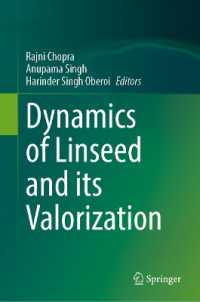Full Description
This second edition of Georgian: A Learner's Grammar is a completely revised and updated guide to the fascinating and most widely spoken language of the Caucasus.
Presenting the language in the form of dialogues and reading passages, full attention is given to script reproduction and recognition, pronunciation, lexis and individual points of grammar.
Key features include:
* highlighting of verbal roots throughout
* new and varied exercises for practice of verb forms
* use of the new Georgian currency
* examples of Georgian literature, both poetry and prose, and each with its own self-contained vocabulary * a reference section providing an answer key, a Georgian-English glossary and an index of grammatical terms.
With a varied and extensive range of exercise work, this new edition provides a comprehensive and carefully graded grammar of Georgian that has been successful over a number of years of use in the classroom.
Contents
Introduction. Lesson 1. Some formal and informal methods of introducing yourself and others The Nominative case of nouns Adjective-agreement with Nominative nouns The formation of adverbs Asking questions (including some formal set-expressions) Some locative expressions The personal pronouns, possessive pronouns and adjectives The Present tense forms of the verbs 'be', 'come/go', 'run', 'be sitting, standing, lying'. Lesson 2. The plural of nouns Dative and Genitive case-forms Adjective-agreement with Datives and Genitives The form of demonstrative adjectives outside the Nominative Directional preverbs Numbers (cardinals and ordinals) How to tell the time Days of the week Months of the year The Present tense of the verbs 'stand up, lie down, sit down' Lesson 3. How to give your age and ask about another's age The comparative and superlative grades of adjectives and adverbs The Instrumental case Adjective-agreement with the Instrumental More of the language's postpositions The past tense of the copula, the basic verb of motion, the stative forms 'be sitting, standing, prostrate' and the dynamic equivalents 'sit down, stand up, lie down' Subject-agreement markers on the verb Lesson 4. The three-way division of the tense-system The marking of subject and object with transitive verbs in the Present (etc.) Word-order The Present Tense of transitive verbs Neutral Version Verb-agreement with 3rd person plural subjects The loss/reduction of -o- in the noun-declension The Adverbial case of nouns Adjective-agreement with nouns in the Adverbial case The postposition -made 'up to' Lesson 5. Subjective Version Indirect Objects Locative Version Indefinite Pronouns and Adverbs Articles Lesson 6. Future of transitive verbs Object-agreement affixes Reflexives Emphatics. Lesson 7. Objective version How to say 'too, also' The emphatic interrogative particle meaning 'pray, on earth!' Relative clauses The potential negative The Vocative case Adjective-agreement for the Vocative Lesson 8. The syntax associated with transitive verbs in Series II The Ergative case of nouns Adjective-agreement with nouns in the Ergative The conjugational patterns for transitive verbs in Series II Lesson 9. Colloquial relative clauses Temporal clauses meaning 'when' Temporal clauses meaning 'while' Manner clauses meaning 'as, like' Temporal clauses meaning 'as soon as' Temporal clauses meaning 'after' Noun-clauses introduced by 'that' Causal clauses meaning 'because, as, since' Simple Conditional clauses The Present Indicative of the verb 'know' Lesson 10. The Present and Future Indicative forms of intransitive verbs The meaning of this type of intransitive verb The syntax of intransitives How to associate indirect objects with intransitive verbs The Future forms of the verbs 'be', 'come/go', 'run', 'be sitting/standing/lying', 'sit down', 'stand up', 'lie down' Lesson 11. The formation of the Aorist Indicative for intransitive verbs The syntax of Aorist Intransitives The Present, Future and Aorist Indicative formations of the Medial verbs The syntax of Medial verbs in Series I and II (Present, Future, and Aorist Indicatives) Verbs whose tenses can be altered through use of a Version vowel Lesson 12. The formation of the Aorist Subjunctive for Transitive, Intransitive and Medial verbs Some uses of the Aorist Subjunctive How to issue an instruction (Imperatives) How to say 'Don't VERB!' (Prohibitions) Lesson 13. The essentials of the so-called Stative Verbs The formation, agreement-patterns and syntax of the so-called Indirect Verbs in the Present, Future and, where relevant, Aorist Indicatives (plus the Aorist Subjunctive) How to say 'X wants to VERB' an








